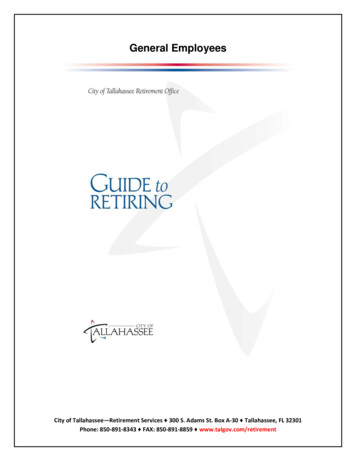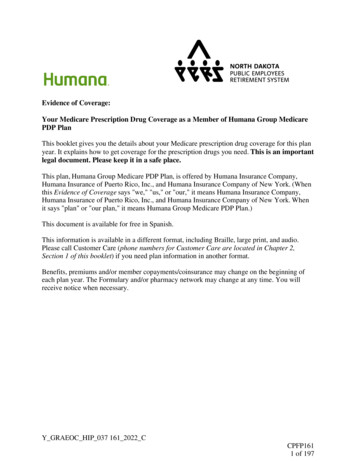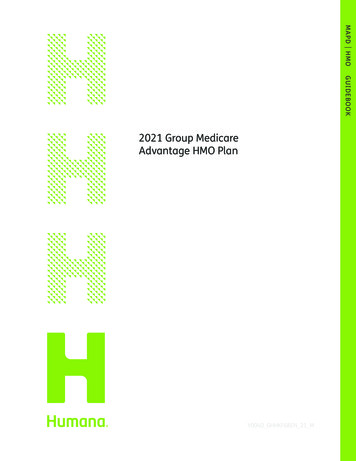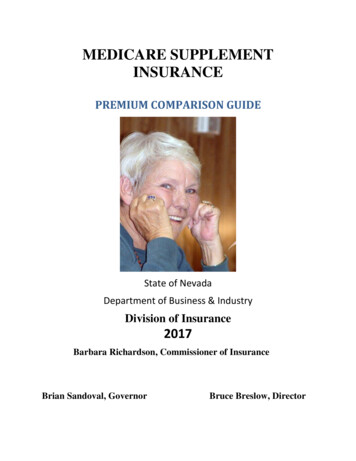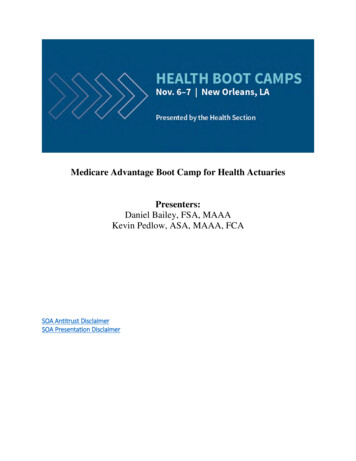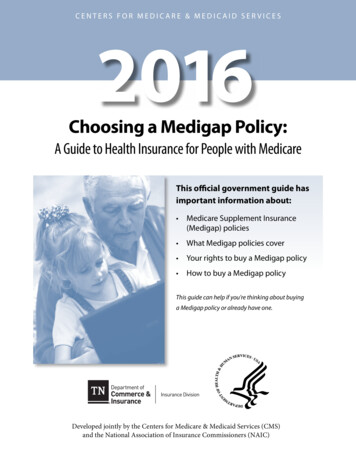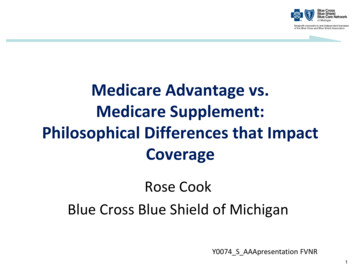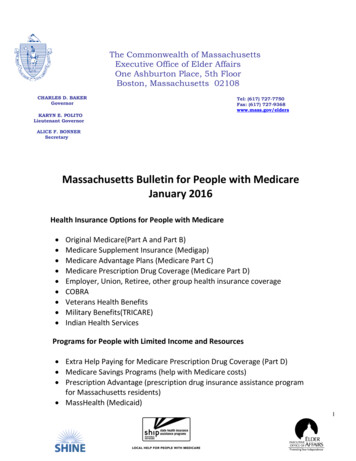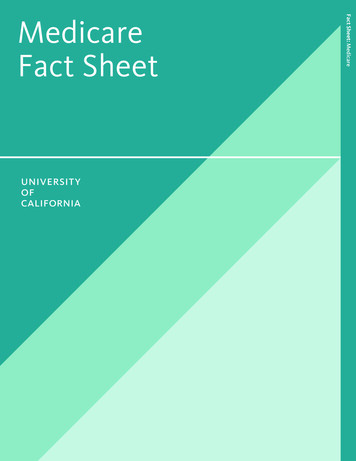
Transcription
Fact Sheet: MedicareMedicareFact Sheet
YOUR MEDICARE ID CARD AND MBI NUMBERCHANGING YOUR ADDRESS WITH UC AND MEDICAREYour Medicare Beneficiary Identifier (MBI) is a randomly-generated number that Medicare uses instead of yourSocial Security Number to identify you. It has 11characters made up of numbers and letters.UC Visit mymedicare.gov to create an online Medicareaccount, view your MBI number or print a copy ofyour card. Or call 800-MEDICARE (800-633-4227). TTY userscan call 877-486-2048.WATCH OUT FOR SCAMSMedicare will never call you uninvited and ask you togive them personal or private information to get yourMedicare number or card.If someone asks you for your information or for money,or threatens to cancel your health benefits if you don’tshare your personal information, hang up and call800-MEDICARE (800-633-4227).You can change your address with UC using your UCRetirement At Your Service (UCRAYS) online account.Visit ucal.us/retireehelp for instructions. You will be ableto enter a home, mailing or temporary address. Aconfirmation statement will be mailed to your homeaddress.MEDICAREIf you are enrolled in Medicare, you can change youraddress online by using a my Social Security account atwww.ssa.gov/myaccount. Go to the My Profile Tab onmy Social Security.You will be asked to supply a street address to remaineligible for insurance in a Medicare plan. P.O. Boxes arenot acceptable as a home address.If you get Social Security Income (SSI), do not have aU.S. mailing address, or are unable to change youraddress online, you can: Call 800-772-1213 (TTY 800-325-0778), Mondaythrough Friday from 7 a.m. to 7 p.m.For More Information About MedicareThese organizations may be able to answer yourquestions about Medicare.Medicare plan benefitsCenters for Medicare and Medicaid Services (CMS)800-633-4227 (available 24 hours a day, 7 daysa week)medicare.govEnrolling in Medicare and premium paymentsSocial Security Administration (SSA)800-772-1213800-325-0778 TTYwww.ssa.govGeneral health insurance and MedicareinformationHealth Insurance Counseling and Advocacy g2 Contact your local Social Security office. You cansearch for your local office by zip code atsecure.ssa.gov/ICON/main.jspIf you do not receive Social Security benefits, SSI orMedicare, you do not need to change your address withMedicare.
If you’re 65, chances are you’re eligible for Medicare—the federalprogram begun in the 1960s to provide those age 65 and overwith secure access to medical care.If you’re still working at UC, your UC employee medical planremains your primary coverage even if you enroll in Medicare,but you may need to make some decisions about Medicare foryourself or a family member who is turning 65.If you’re retired, UC offers several plans that coordinate withMedicare. Often this coordination means that you pay less forcertain medical expenses than you would if you had only OriginalMedicare coverage (Part A and B).These plans may also be available to those under 65 who qualifybecause of disability, permanent kidney failure (end-stage renaldisease) or amyotrophic lateral sclerosis (ALS).This fact sheet covers the basics of Medicare, including when toenroll and how it works together with UC-sponsored medicalplans. It also includes information comparing the coverage andcosts of the UC-sponsored medical plans that coordinate withMedicare.The A, B, C and D of Medicare .4How and When to Enroll in Medicare .7If you turn 65 and you’re still working for UC . .7If you’re over age 65 and you retire from UC.8If you turn 65 and you’re already retired .9If you are over 65 and return to work at UC . .9If you are retired from UC, Medicare-eligible andemployed outside of UC . .10If you live outside the U.S. .10If you are eligible for Medicare through yourspouse’s work record .10UC Medical Plans for Medicare Enrollees .11Via Benefits Medical Plans for Medicare Enrollees .13What You Pay for Services .14TipTo keep your UC-sponsored retiree medical coverage,you need to enroll in Medicare at the appropriatetime (see “How and When to Enroll in Medicare” onpage 7), assign your Medicare to your UC medicalplan and keep current on your Medicare premiumpayments. Remember that once you retire, Medicarebecomes your primary medical insurer and coordinates benefits with your UC-sponsored plan. YourUC medical coverage depends on you keeping yourMedicare coverage. If you don’t keep up with yourMedicare premiums, you could lose your UC medicalcoverage and pay penalties to UC and Medicare.If you’re disabled, please also see Your Guide toDisability Benefits for important information thatapplies to you.3
The A, B, C and D of MedicareThe A, B, C and D of MedicareMedicare’s terminology can be confusing at first, butonce you understand a few essentials, it becomes fairlystraightforward. Medicare has four parts: A, B, C and D.The term “Original Medicare” refers to Part A andPart B benefits only.Part A covers hospital inpatient care, skilled nursingand hospice care, and home health services. It’s“premium-free,” as long as you, your spouse or yourex-spouse have worked full time for 10 years and paidSocial Security taxes. If you qualify through your spouseor ex-spouse, you need to have been married at least10 years.*Part B covers outpatient medical services like doctorvisits, including some preventive care as well asambulance services, mental health care, and durablemedical equipment like wheelchairs and walkers.You must pay a monthly premium to maintain MedicarePart B coverage. Under Medicare regulations, thismonthly premium is higher for those with higherincomes. Part B premiums are paid to the SocialSecurity Administration (SSA). If you’re receiving SocialSecurity income, the premiums will be deducted fromyour monthly Social Security benefit. If not, SocialSecurity will bill you directly.If you’re eligible for one of UC’s Medicare-coordinatedmedical plans, it’s possible that you’ll get a portion ofyour Part B premium refunded to you. That’s because theamount UC contributes toward your retiree medicalbenefits is sometimes higher than the total cost of thepremium. If this is the case, the university will refund partof the amount that you pay for your Medicare Part Bpremiums. (This reimbursement is added to your UCRPmonthly pension benefit payment or sent via check toeligible Savings Choice members.) To be eligible for UCmedical plan coverage, you must have “assigned” yourMedicare to the UC medical plan at the appropriate timeonline through UCRAYS or by completing a form. Youalso must maintain continuous enrollment by paying bothyour Part B premium to Social Security and your portionof the UC medical plan premiums to UC on time.For 2022, UC’s contribution covers, on average, 70percent of the total premium for the UC medical plan.* To learn more about how you may qualify through a spouse, formerspouse or deceased spouse, please contact the Social SecurityAdministration at 800-772-1213 or visit ssa.gov; see page 10.4Part C is different—it doesn’t refer to a separatesubsection of care like Parts A, B and D. Instead, it’sanother term for Medicare Advantage plans—a type ofMedicare-approved plan run by private companies. UCoffers Medicare Advantage plans with HMO and PPOoptions. Under these arrangements, you’re required toassign your Medicare Parts A and B benefits to your plan(enrollment into D is automatic), and to maintain thatassignment. In return, the plan provides all of yourbenefits. To learn more about how this works, see “HowUC Medical Plans Work with Medicare,” on page 12.Part D covers prescription drugs. The cost is folded intoyour UC-sponsored medical plan premium. Most UCretirees don’t pay an extra premium for Part D coverage,but you may pay a premium if your income is above acertain dollar amount. See “More about Part D” forinformation about how Part D coverage coordinates withspecific UC Medicare medical plans.SOCIAL SECURITY AND MEDICAREPeople tend to link Social Security and Medicare, butthere are many instances when they are not connected.For example, the age at which individuals are eligible fortheir full Social Security benefit may be later than age65, but the Medicare eligibility age remains at 65. Also,some long-term faculty and staff, and Safety Members,have not made contributions to Social Security, and thusare not eligible for premium-free Medicare Part A. If thisapplies to you, you will continue to be enrolled in anon-Medicare UC medical plan—unless you are eligiblefor Medicare through a spouse, former spouse or otherwork credit from a different employer. The Universityrequires a denial letter from Social Security to continueyour non-Medicare medical plan past age 65.YOUR RESPONSIBILITYThere are three steps most UC members need to taketo enroll in a Medicare plan:1. C all, visit or go online to Social Security to enroll inMedicare2. Assign your Medicare to your UC medical plan3. Pay your Medicare and UC plan premiums
Unless you are still working for UC or currently coveredfor insurance by another UC employee, you must signup for Medicare when you turn age 65, if you’re eligible.Generally, you’re first eligible for Medicare Part A and PartB starting 3 months before you turn 65. If you don’t signup and assign your Medicare to your UC plan by the dateyou turn age 65, you will remain in the non-Medicare plan.You will also pay a significant penalty on top of yourmonthly non-Medicare premium and you risk terminationof your UC medical plan. Once you enroll in and assignyour Medicare, you’ll move to a UC-sponsored medicalplan that coordinates with Medicare. If you are eligible forSocial Security, you can still enroll in Medicare withoutelecting to receive Social Security.If you’re not eligible for premium-free Medicare Part A,send your denial letter from Social Security to UCbefore you turn 65 and you’ll continue in yourUC-sponsored non-Medicare medical plan.STEP 2—ASSIGN YOUR MEDICARETo ensure that your Medicare coverage and your UCcoverage work together properly, you must “assign” yourMedicare benefits to your medical plan. You can complete this step on UCRAYS or by submitting the appropriate form for your current medical plan, as noted below.The A, B, C and D of MedicareSTEP 1—ENROLL IN MEDICAREdrug coverage coordinates with your UC medical plan.You don’t need to—and should not—buy or participate in Part D drug coverage from any other source.Enrolling in Other Employer, Retiree or Part D PlansUnder Medicare rules, you’re not allowed to be enrolledin more than one “creditable” Part D or MedicareAdvantage plan. (“Creditable” just means that the plan’scoverage is likely to pay at least as much as the standardMedicare benefit.)So, if you have Medicare-coordinated insurance withanother employer or retiree plan that includes creditablePart D prescription drug coverage or you enroll in anindividual Part D plan, you cannot also have Part Dcreditable coverage with a UC plan. If you decide tokeep the other plan, you may be able to suspend yourUC coverage, or enroll in UC Medicare PPO withoutPrescription Drugs. To learn more about suspendingcoverage, take a look at the Group Insurance EligibilityFact Sheet for Retirees and Eligible Family Members(ucal.us/gieretirees).UC Medicare PPO Without Prescription DrugsAll forms are available on UCnet at ucal.us/forms. EachMedicare member you cover completes a separate form.If you submit a form to assign your Medicare, the signedand completed form must be returned to UC the monthprior to your desired Medicare effective date. For example, if you turn 65 in July, UC needs your form in June,along with a copy of your Medicare card, if available.To enroll in this plan you must be enrolled in a non-UCprescription drug plan and send proof of enrollmentto UC. Proof from your Part D insurance plan shouldinclude the names of all enrolled members and the PartD start date. Enrollment in Original Medicare does notqualify as a standalone prescription drug plan, sinceMedicare Parts A and B do not cover all categories ofdrugs. Make sure you are enrolled in both a medical andprescription drug plan. Medicare will charge you a lateenrollment penalty if you have a gap in your creditablecoverage. The penalty is permanent, even if you re-enroll.UC’s Medicare Advantage plans:UC Medicare Choice—UC Medicare Choice (UBEN 121)STEP 3—PAY YOUR MEDICARE AND YOURUC MEDICAL PLAN PREMIUMSKaiser Senior Advantage—Medicare Advantage UniversalEnrollment/Election Form for Kaiser Senior Advantage(UBEN 127)UC’s Part D plans:UC Medicare PPO or UC High Option Supplement toMedicare—Blue Cross MedicareRx (PDP) with Senior RxPlus Enrollment Form for UC Medicare PPO or UC HighOption Supplement to Medicare (UBEN 123)Medicare Part D and Your UC Medicare PlanIn all UC Medicare plans except UC Medicare PPO without Prescription Drugs, your Medicare Part D prescriptionUnder Medicare rules, if you are enrolled in Medicareyou need to maintain continuous creditable prescriptiondrug coverage whether you have a Part D or MedicareAdvantage plan. To do this, you must continue payingyour Medicare premium to Social Security as well asyour medical plan premium to UC (your payment to UCis usually deducted from your monthly benefit check). Ifyou don’t pay your Part B or D premiums to SocialSecurity, UC will be notified and you could lose your UCmedical coverage altogether.If you have a break in medical coverage and don’t enrollin another plan with prescription drug coverage within63 days, Medicare will charge you a permanent Late5
The A, B, C and D of MedicareThe A, B, C and D of MedicareEnrollment Penalty (LEP). As of January 2020, this LEP isbilled to you directly for payment by your medical plan.This includes members who have a current LEP or anyfuture LEPs.YOUR COSTS FOR MEDICARE COVERAGEMedicare Part A is usually premium-free. There is alwaysa monthly premium for Part B coverage. You pay theSocial Security Administration for your Part B premium.Usually it is deducted from your Social Security benefit.If you are not receiving a Social Security benefit at thistime, there are four ways you can pay your Medicare bill:1. P ay directly from your bank account through yourbank’s online bill payment service. Contact your bankor go to their website to set this up.2. S ign up for Medicare Easy Pay (at medicare.gov/medicare-easy-pay), a free service that automaticallydeducts your premium payments from your savings orchecking account each month, usually on the 20th.3. Pay by check or money order. Mail your Medicarepayment coupon from Social Security with your payment.4. P ay by credit card or debit card.The standard Part B premium amount in 2022 is 170.10 (or higher depending upon your income).However, if you pay your Part B premium throughyour monthly Social Security benefit, you may pay less( 130.00 on average). Social Security will tell you theexact amount of your Part B premium.You may pay the standard premium amount if: You enroll in Part B for the first time in 2020 You have Medicare and Medicaid, and Medicaid paysyour premiums (your state will pay the standardpremium amount of 144.60)Individuals with a Modified Adjusted Gross Income(MAGI) reported on their 2020 federal tax return ofmore than 91,000 (more than 182,000 for marriedcouples) will pay 170.10 plus an additional amountbased on their income (see chart at right). If you had amajor life-changing event such as a work stoppage orreduction and your income has gone down, you may useform SSA-44 from the Social Security Administration(available at www.socialsecurity.gov/forms/ssa-44.pdf)to request a reduction in your income-related monthlyadjustment amount.6The Part D plan premium for most UC retirees will bezero. Most people are not charged a premium for PartD. However, as with Part B, you may pay a Part Dpremium based on your MAGI (see chart below). TheseMedicare premiums are paid to Social Security and arein addition to any premiums you pay UC for your UCinsurance.MEDICARE PREMIUMS BASED ON INCOMEThough the standard Part B premium for 2022 is 170.10, you may pay more depending on yourModified Adjusted Gross Income (MAGI).Modified AdjustedGross Income (MAGI)Part B monthlyPremium*amount/personPart D monthlyPremium*amount/personIndividuals with MAGI of 91,000 or less andmarried couples with aMAGI of 182,000 or lessStandardpremium 170.10Included in yourplan premiumIndividuals with MAGIof 91,001 to 114,000and married coupleswith MAGI of 182,001to 228,000Standardpremium 68.00Your initial planpremium** 12.40Individuals with MAGIof 114,001 to 142,000and married coupleswith MAGI of 228,001to 284,000Standardpremium 170.10Your initial planpremium** 32.10Individuals with MAGIof 142,001 to 170,000and married coupleswith MAGI of 284,001to 340,000Standardpremium 272.20Your initial planpremium** 51.70Individuals with MAGIof 170,001 to 500,000and married coupleswith MAGI of 340,001to 750,000Standardpremium 374.20Your initial planpremium** 71.30Individuals with MAGIgreater than or equal to 500,000 and marriedcouples with MAGIgreater than or equal to 750,000Standardpremium 408.20Your initial planpremium** 77.90* These premium amounts are set by Medicare, not the university.** For most UC retirees, the Part D plan premium will be 0.
You’ll most likely become eligible for Medicare whenyou turn 65, but it could happen earlier as a result ofbecoming disabled or being diagnosed with end-stagerenal disease or amyotrophic lateral sclerosis.If you are an employee and covered by a UC medical plan,UC will send you a letter about Medicare a few monthsbefore you reach age 65. As long as you remain an eligibleemployee, your coverage in a UC employee medical plancan continue as primary regardless of your age or whetheryou enroll in Medicare (see Important Note below).If you or a covered family member are eligible for Medicare when you retire, typically age 65 or older, you mustenroll in and assign your Medicare to your UC medicalplan by the first day of your retiree health coverage. UCwill complete a Verification of Employment form for you togive Social Security as part of your Medicare enrollment.If you’re a retiree under 65 and covered by a UC medicalplan, UC will send you a Medicare information packetthat includes enrollment instructions three monthsbefore your 65th birthday. In general, Medicare and UCrequire enrollment at age 65. (If your birthday is on thefirst day of the month, Part A will start the first day of theprior month.)It’s generally to your advantage to follow the guidelinesbelow. These guidelines also apply to any covered familymembers who become eligible for Medicare.IF YOU TURN 65 AND YOU’RE STILLWORKING FOR UCMEDICARE PART AIf you’re receiving Social Security, Railroad Retirementor Civil Service benefits, you’ll be enrolled automatically in Part A. If you want to defer enrollment, contactSocial Security or follow the instructions sent with theMedicare card you receive in the mail.Even if you’re not receiving Social Security or the otherbenefits mentioned above, you may want to enroll inMedicare Part A, hospital insurance, because there is nopremium if you have worked for 10 years and had SocialSecurity taxes deducted. Your UC coverage will remainyour primary coverage while employed, and yourMedicare Part A may contribute something towardyour medical expenses. Contact the Social SecurityAdministration (800-772-1213) to enroll.Important Note: If you are enrolled or consideringenrolling in the UC Health Savings Plan, you may want todefer enrollment in Medicare Part A and/or B while youare working because Medicare enrollees cannot contribute to a Health Savings Account. If you or an enrolledfamily member enrolls in Medicare, you should contactUCPath to enroll in a different UC medical plan. If yourfamily member enrolls in Medicare, you may be able tocontinue making contributions for the rest of the planyear, however the amount will be prorated. ContactHealth Equity at 866-212-4729 for more information.MEDICARE PART BIf you’re already receiving Social Security, Railroad Retirement or Civil Service benefits when you become eligiblefor Medicare, Social Security will automatically enrollyou in Part B; however, you are not required to enrollwhile you are working if you have employer-sponsoredmedical coverage. Most employees wait until they retirebecause of the cost of Medicare Part B premiums as longas your insurance is continuous, without a gap, from yourdate of separation to your date of retirement. If you willhave a gap of less than 120 days between separationand retirement, be sure to enroll in COBRA, a creditableplan through Covered California, or a spouse or domesticpartner’s plan(s) during this time to maintain your eligibility for retiree health and welfare coverage. At retirement,you’ll have a special enrollment period to enroll and youwill not be subject to late enrollment penalties. Be sureto contact Social Security three months prior to yourretirement to coordinate your Medicare start date orenroll online at medicare.gov.Domestic partners covered by UC employees need toenroll in Part B at age 65 to avoid potential Medicarepenalties and to comply with UC’s requirements.TipIf you’re still working and covered by both youremployer plan and Medicare, show your employergroup health plan ID card when you visit your doctoror hospital to obtain services. Tell your provider tosubmit claims to your UC plan first and Medicaresecond. If you don’t, there could be mix-ups inprocessing your claims. If you have questions aboutyour coverage, please contact the UC RetirementAdministration Service Center at 800-888-8267.7How and When to Enroll in MedicareHow and When toEnroll in Medicare
How and When to Enroll in MedicareHow and When toEnroll in MedicareNote: Actively employed Kaiser members might want toenroll in Part B at 65. Once you enroll, you can assignyour Medicare benefits to Kaiser. In return, Kaiser willenroll you into the “working aged” plan which will waivemedical and pharmacy co-payments, and provide chiropractic and enhanced hearing aid coverage and aneyewear allowance not provided in your employee plan.You continue to pay the employee rate for this plan untilyou become a retiree, in addition to your Medicare Part Bmonthly premium.If you move out of California and all your enrolled familymembers are in Medicare, you may be eligible to enroll inan individual medical plan offered by Via Benefits. Yourenrollment must be coordinated through UC to receivethe UC contribution. (See page 13 for more details.)IF YOU’RE OVER AGE 65 AND YOU RETIRE FROM UCIf you each have separate UC insurance and you retire:If you are Medicare-eligible, you will enroll in Medicareand assign your Medicare to the Medicare version of yourcurrent UC plan. (See page 5 for more information.) Ifyour working spouse/partner is Medicare-eligible, theydo not have to enroll in Medicare while employed andthey will retain their current UC employee plan. If eitherperson wants to change their plans, they may do so atthe next Open Enrollment.If you are already enrolled in Medicare Part A, notifyMedicare as soon as you stop working. Your record willbe changed to make Medicare primary for any claimsincurred after you retire. If you do not notify Medicare,claims may be processed incorrectly.If you are not enrolled in Medicare Parts A and B,you can apply up to 90 days before you retire. CallSocial Security (800-772-1213) for the officenearest you or enroll online at medicare.gov. If youare eligible and don’t enroll, Medicare can chargeyou a permanent 10 percent penalty for each fullyear you could have had Part B and didn’t: 1 percentper month for each full month that you didn’t havePart D or other creditable drug coverage.If your 65th birthday occurs around the same time thatyou retire from UC, talk with Social Security aboutMedicare’s Initial Enrollment Period (IEP) and SpecialEnrollment Period (SEP) rules. Your local Benefits Officecan also review UC’s Medicare policy and help youdetermine which month to contact Social Security toget the Medicare start date you want.If you are 65 and older when you retire, Social Securitymay ask you to verify your medical coverage fromage 65 to the date of your retirement. Call the UCRetirement Administration Service Center for aVerification of Employment form.If you or your family members turn age 65 and are noteligible for premium-free Part A, you’ll need to sendUC a copy of the denial letter from the Social SecurityAdministration. To get a denial letter, you must apply forMedicare. If your Part A is not premium-free, UC doesn’trequire you to enroll in Medicare or a Medicare plan.8IF YOU AND YOUR SPOUSE OR DOMESTIC PARTNERARE BOTH UC EMPLOYEESIf one of you continues working and the other retires,what happens to your UC insurance and what actionsyou need to take regarding Medicare vary depending onyour circumstances.If you are covered under your working spouse/partner’s UC insurance and you retire: Whether or notyou are eligible for Medicare, you have the option tocontinue coverage in your current UC employee planuntil your working spouse/partner leaves UC employment or stops your coverage during an Open Enrollment.Generally, if you are covered under an employer-sponsored medical plan you may delay enrollment intoMedicare. However, domestic partners are encouragedto contact the Social Security Administration before age65; different rules may apply.If either person wants to change plans or opt forseparate coverage, or if you wish to cover your workingspouse/partner after you retire, you may make thosechanges during the Open Enrollment either prior to orafter your retirement. Duplicate coverage under a UCemployee and retiree plan is not allowed. Check theplans you are enrolled in before you elect new coverageas a retiree.
Enroll in Medicare. This isn’t optional—it’s required ifyou are eligible and you want to continue your UCsponsored medical coverage. You may also be subjectto lifelong Medicare penalties if you don’t sign up assoon as you’re eligible. UC also assesses penaltiesfor non-enrollment, and you could be permanentlyde-enrolled from your UC medical coverage. (There aretwo exceptions; see “If You Live Outside the U.S.” fordetails and see page 5, Step 1 if you are not eligible forpremium-free Medicare Part A.)Assign your Medicare before you turn 65. See page 5for more information.KEEP PAYING YOUR MEDICARE PART B OR PART DPREMIUMSIf you stop paying Social Security for your Part B and/orPart D premiums, Medicare notifies the university thatyou are no longer eligible for the Medicare plan. UC willthen move you to a non-Medicare plan, stop any Part Breimbursement and charge you a significant penalty permonth while you are not enrolled in Medicare. Thepremium for the non-Medicare plan is typically higherthan the premium for the Medicare plan and yourinsurance must be continuous. To re-enroll, you may berequired to re-assign your Medicare to your UC plan.Your non-Medicare plan will be terminated if you do notre-enroll in Medicare promptly.To re-enroll in Medicare, contact the Social SecurityAdministration by phone 800-772-1213 or online atssa.gov.IF YOU ARE OVER 65 AND RETURN TO WORK AT UCIf you’re retired and return to work at UC, you may needto enroll in a non-Medicare employee plan.If you’re rehired after retirement, you’re allowed to workan average of no more than 43 percent time during a12-month period. In most cases, if your appointment iswithin this policy, your retiree insurance benefits willcontinue and your UC Medicare plan remains yourprimary coverage. Your retiree benefits also continue ifyou are appointed by agreement or are in a per diemappointment.If you become eligible for UC employee medicalcoverage because of your rehired appointment, federallaw requires that Medicare no longer be your primarycoverage. That means you’ll have to suspend yourretiree medical plan and enroll in an employee plan.Medicare would then become your secondary coverage.Your other option is to suspend both UC-sponsoredretiree and employee medical coverage and havecoverage by Original Medicare Parts A and B only, andpurchase a standalone Part D plan.If you enroll in an employee plan, your premium will bededucted from your employee earnings and, in most cases,your premium will increase. If you are receiving anyMedicare Part B reimbursement from your UC retiree plan,it will stop. You also need to complete a Medicare Advantage or Prescription Drug Plan Disenrollment Form (UBEN101) to stop assignment of Medicare to your UC retireeplan. While you are covered as an employee, be sure toshow your employee medical plan ID card (not yourMedicare card) to your doctor for correct claims payment.You may also cancel your Medicare Part B enrollmentthrough Social Security while you are working, if you areeligible for employee medical coverage as a result ofreturning to work at UC.RE-RETIREMENTBe sure to re-enroll in Medicare and unsuspend your UCretiree insurance immediately when you end employment,to avoid penalties and comply with UC requirements.Unlike your first UC retirement, your locati
The cost is folded into your UC-sponsored medical plan premium. . UC Medicare Choice—UC Medicare Choice (UBEN 121) Kaiser Senior Advantage . (PDP) with Senior Rx Plus Enrollment Form for UC Medicare PPO or UC High Option Supplement to Medicare (UBEN 123) The A, B, C and D of Medicare The A, B, C and D of Medicare. IF YOU ARE ELIGIBLE FOR .
